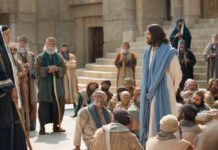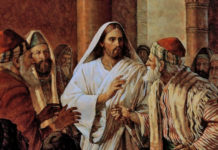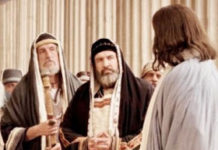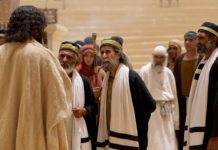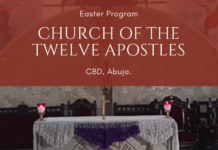FIRST READING
“These are the feasts of the Lord, which you shall proclaim as times of holy convocation.”
A reading from the Book of Leviticus (Lev. 23:1.4-11.15-16.27.34b-37)
The Lord said to Moses, “These are the appointed feasts of the Lord, the holy convocations, which you shall proclaim at the time appointed for them. In the first month, on the fourteenth day of the month in the evening, is the Lord’s Passover. And on the fifteenth day of the same month is the feast of unleavened bread to the Lord; seven days you shall eat unleavened bread. On the first day you shall have a holy convocation; you shall do no laborious work. But you shall present an offering by fire to the Lord seven days; on the seventh day is a holy convocation; you shall do no laborious work.” And the Lord said to Moses, “say to the sons of Israel, when you come into the land which I give you and reap its harvest, you shall bring the sheaf of the first fruits of your harvest to the priest; and he shall wave the sheaf before the Lord, that you may find acceptance; on the day after the Sabbath the priest shall wave it. “And you shall count from the day after the Sabbath, from the day that you brought the sheaf of the wave offering; seven full weeks shall they be, counting fifty days to the day after the seventh Sabbath; then you shall present a cereal offering of new grain to the Lord. “On the tenth day of this seventh month is the day of atonement; it shall be for you a time of holy convocation, and you shall afflict yourselves and present an offering by fire to the Lord. “On the fifteenth day of this seventh month and for seven days is the feast of booths to the Lord. On the first day shall be a holy convocation; you shall do no laborious work. Seven days you shall present offerings by fire to the Lord; on the eight day you shall hold a holy convocation and present an offering by fire to the Lord, it is a solemn assembly; you shall do no laborious work. “These are the appointed feasts of the Lord, which you shall proclaim as times of holy convocation, for presenting to the Lord Offerings by fire, burnt offerings and cereal offerings, sacrifices and drink offerings, each on its proper day.”
The word of the Lord.
RESPONSORIAL PSALM Psalm 81:3-4.5-6ab.10-11ab (R.2a)
R/. Sing joyfully to God our strength.
Raise a song and sound the timbrel,
the sweet-sounding harp and the lute:
blow the trumpet at the new moon,
when the moon is full, on our feast. R.
For this is a statute in Israel,
A command of the God of Jacob.
He made it a decree for Joseph,
when he went out from the land of Egypt. R.
“Let there be no strange god among you,
nor shall you worship a foreign god.
I am the Lord your God,
Who brought you up from the land of Egypt.” R.
ALLELUIA 1 Peter 1:25
Alleluia. The word of the Lord abides forever; that word is the good news which was preached to you. Alleluia.
GOSPEL
“Is not this the carpenter’s son? Where then did this man get all this?”
A reading from the holy Gospel according to Matthew (Matthew 13:54-58)
At that time: Coming to his own country, Jesus taught them in their synagogue, so that they were astonished, and said, “Where did this man get this wisdom and these, mighty works? Is not this the carpenter’s son? Is not his mother called Mary? And are not his brethren James and Joseph and Simon and Judas? And are not all his sisters with us? Where then did this man get all this?” And they took offence at him. But Jesus said to them, “A prophet is not without honour except in his own country and in his own house.” And he did not do many mighty works there, because of their unbelief.
The Gospel of the Lord.
Today’s Reflection
The gospel of today shows how dreadful the evil of prejudice can be. The people of Jesus’ own home town could not accept him because he was the ‘Carpenter’s Son’ and a brother of those people who lived around them. For them he was to familiar and ordinary to “accept him”. As a consequence of such a negative attitude, Jesus “did not work many miracles there because of their lack of faith.” He is aware of the universal truth that “A prophet is despised only in his own country and in his own house.” Prejudice prevents us from knowing, believing and trusting someone. On the contrary an attitude of openness and acceptance helps us grow in knowledge, faith and love. Are we blinded by prejudice in our attitude to people and events? Do we despise and reject people because of their eternal appearance and simple background?
